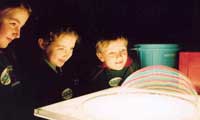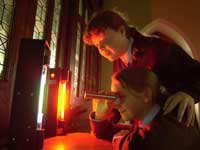GRID: a European network of good practice in science teaching Inspire article
Sibylle Moebius introduces a project, GRID, to identify and promote innovative science education in Europe.

for primary school children
in Waterford, Ireland
The GRID project, GRowing Interest in the Development of teaching science, aims to create a network of decision-makers and schools to exchange good practices in European science teaching. The primary objective is to identify, analyse and promote primary- and secondary-school initiatives to make science teaching attractive. The ultimate aim is to disseminate the best practices thus identified via a websitew1.
The first stage of the GRID project was to analyse European education policies with a direct impact on schools. This was done by reviewing policy reports, recommendations and institutional plans published by ministries, regional and local education authorities, and educational institutions. This report is currently being finalised and will be available on the GRID website.
Via the GRID website, a major survey has been launched to identify and analyse existing school initiatives to increase the attractiveness of science. If you are a science teacher in a primary, lower or upper secondary school who is involved in an isolated classroom-based initiative, or who is running a major local, county, regional, national or even international project, we encourage you to participate in the survey.

Week at the Waterford
Institute of Technology,
Ireland
In each of the partner countries, the six to 12 best projects will be selected as case studies. The purpose of the case studies is to maximise the impact of existing projects and encourage their spread across Europe. The case studies will include video clips and interviews with the teachers involved.
Subsequently, workshops will be organised in each partner country, in which teachers can share their experiences and offer advice to others interested in setting up similar science education projects.
The first results
The GRID survey of innovative science education projects in Europe has already identified some particularly inspiring projects.
Physics is Cool (Belgium)
The University of Antwerp has developed a project for secondary schools called ‘Physics is Cool’w2. Some 40 kits contain all the materials needed to carry out a wide range of experiments with 14-17 year-old students. A teacher’s guide and a CD are also included. The experiments are intended to provoke discussion and improve scientific communication between students, to make them aware of the causes of everyday phenomena, and to confront them with experiments which are rather easy to do but sometimes difficult to explain.
The Ada Lovelace Project: mentoring for women in science and technology (Germany)
Female university students in science, engineering and mathematics act as mentors to schoolgirls as part of the Ada Lovelace Projectw3. The mentors are trained in communication and moderation methods, with supervision by pedagogy or psychology staff. They visit schools and discuss reasons to study science, engineering and mathematics, offer advice on overcoming obstacles, and inform the school students about university life. As a second step, the mentors invite girls to participate in university courses and laboratory work.
Life Learning Center (Italy)
The main goal of the Life Learning Centerw4 is to provide teachers and school students with hands-on laboratory experience of the life sciences at university. They learn about modern molecular biology, genetics and biotechnology, and use advanced laboratory equipment with the support and supervision of university tutors.
Chemistry at Work (UK)
Chemistry at Workw5 events demonstrate to school students the importance of chemistry in everyday life and work, with particular emphasis on what is happening in their local area. The events offer a positive image of the chemical sciences and present them as exciting, interesting and financially beneficial activities that are worth considering as the basis of a career.

Waterford Institute of
Technology, Ireland
Updates on the GRID project
The GRID newsletter, available on the GRID website or by email, is aimed at project partners, science teachers, decision-makers, contributors and all others involved and interested in the project. It documents the project and its activities and events, and provides partners and contributors with practical information.
To subscribe to this free newsletter, send an email to Sibylle Moebius (smoebius@amitie.it) with your name, surname, profession, country and email address.
Acknowledgements
The GRID project is funded within the framework of the European Community Socrates Programme, coordinated by the Pôle Universitaire Européen de Nancy-Metz, France, and carried out by a European multidisciplinary consortium.
All images courtesy of GRID partner Sheila Donegan, CALMAST, Waterford Institute of Technology, Ireland.
Web References
- w1 – GRID website
- w2 – Physics is Cool
- w3 – The Ada Lovelace Project
- w4 – Life Learning Center
- w5 – Chemistry at Work





